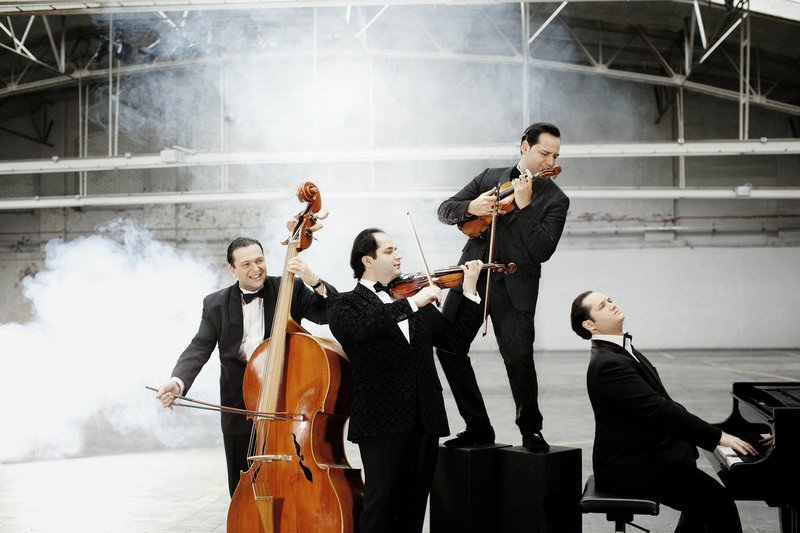Their names may be new to American audiences, but the members of the Janoska Ensemble have pedigrees far longer than this story.
"Each member of the ensemble has a very long tradition of music in their families," says Julius Darvas, double bassist and brother-in-law of the founding Janoskas, Ondrej, Roman and Frantisek. "The Janoskas are the sixth generation of a musician family. The three brothers all studied in Vienna and took lessons from top elite professors at the music university."
FAQ
Janoska Ensemble
WHEN — 7 p.m. Tuesday
WHERE — Walton Arts Center in Fayetteville
COST — $10 (part of the 10x10 Series)
INFO — 443-5600
Darvas, too, studied at the Music University of Vienna and comes from a Hungarian family that "has been passing on the tradition of bass playing over three generations. Our father toured a lot all over the world and brought us LPs and cassettes from jazz to classical music. We listened to the music incessantly and started to improvise along with the recordings."
Unsurprisingly, Darvas says "it was always clear to me that I would become a musician." Since 2001, he has been a member of the Stage Orchestra of the Vienna State Opera and plays for the Vienna Philharmonic Orchestra in addition to his work since 2013 with the Janoska Ensemble. Having played in concert halls around the world -- New York's Carnegie Hall, the Sydney Opera House, Tokyo Suntory Hall and Royal Albert Hall in London -- and shared stages with Bobby McFerrin and B.B. King, this is the Janoskas' first U.S. tour, with stops in New York, Miami, San Antonio, and on Tuesday, at the Walton Arts Center in Fayetteville. The program will be based on their debut album, "Janoska Style," which was released March 10 in the United States by Deutsche Grammophon.
"The Janoska style is our new view of classical music today," Darvas says. "We took the influence of the musical metropole Vienna and combined it with many different genres -- for example, jazz, traditional music, pop, Balkan, Latin American rhythms and tango. Yes, we play classical instruments. But the music we perform is best described as classical with a twist. That twist could be a touch of jazz, rumba or even strains of a Balkan folk tune.
"This is not a rebellion," he adds, "but much more of a renaissance of classical music."
Among the selections on the CD and in tour set lists are "Die Fledermaus Overture à la Janoska," which takes Strauss' themes in a variety of stylistic directions. "Musette pour Fritz" honors Fritz Kreisler using its basic structure to produce a minor-key musette with room to improvise. "Paganinoska" imagines what Paganini might have written today and becomes a musical face-off between Ondrej performing the music as written and Roman, a consummate jazz violinist, with an extemporaneous response.
"Melodie for Melody," composed for Roman's daughter, allows the violins to sing, and "Rumba for Amadeus" is Frantisek's paean to his son and the man he's named after -- Amadeus Mozart. It uses the Piano Concerto No. 20 in D minor as the jumping off point for a rumba pulsing with Latin rhythms. "Adios Nonino," written by Astor Piazzolla for his father, becomes an appropriate and emotional closing number for an ensemble in which family and music tradition are so closely entwined.
"Our concerts often involve a lot of musical improvisation because the musicians know each other's styles so well," says Darvas. "The result is a relaxed musical experience ... where everybody is welcome, even encouraged, to let their emotions run free, clap their hands or stomp their feet.
"The art of improvisation in classical music is lost! We are on the way to bring this fact back in with our music."
NAN What's Up on 03/24/2017
